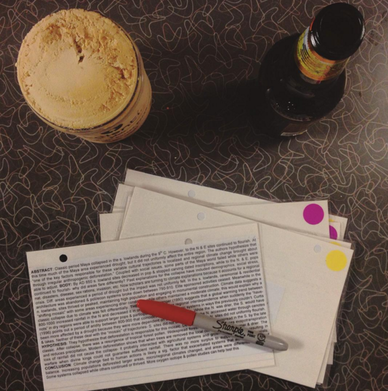I just survived the comprehensive exams for my masters degree, and was inspired by Kate's post about her doctoral exams to write about study strategies that worked for me. Of course, every department does their exams differently, so some of these tips may be more applicable to your exams than others.
How my comprehensive exams worked:
My comprehensive exams were based on a 10 page reading list that was the same for every archaeology student who took comps. It represented the bare minimum of what we were expected to know, and we were encouraged to read additional books and articles tailored to our own geographic and research specialties. The archaeology faculty wrote our questions based on this list, our individual geographic focus, and a "topical" focus that we each had to choose (the options were theory, hunters & gatherers, intermediate societies, and complex societies). We did not get to see our questions ahead of time, so we had to be prepared for anything!
The exam itself took place over 2 days and was held in the department. Each day we were given 5 questions. We had 4 hours to answer 4 of those questions, and we were not allowed to have any outside resources- so it was largely a memorization game! Two days of writing were then followed by an hour long oral defense.
I started studying over the summer, and took the exam in November. I track the time I spend working on toggl.com and, all things said and done, I spent about 280 hours total studying for the exam. This sounds like a lot, but it was spread out over about 7 months. I may have overstudied a bit, but I erred on the side of doing too much preparation rather than too little. I ended up passing with distinction, so I must have done something right =)
How my comprehensive exams worked:
My comprehensive exams were based on a 10 page reading list that was the same for every archaeology student who took comps. It represented the bare minimum of what we were expected to know, and we were encouraged to read additional books and articles tailored to our own geographic and research specialties. The archaeology faculty wrote our questions based on this list, our individual geographic focus, and a "topical" focus that we each had to choose (the options were theory, hunters & gatherers, intermediate societies, and complex societies). We did not get to see our questions ahead of time, so we had to be prepared for anything!
The exam itself took place over 2 days and was held in the department. Each day we were given 5 questions. We had 4 hours to answer 4 of those questions, and we were not allowed to have any outside resources- so it was largely a memorization game! Two days of writing were then followed by an hour long oral defense.
I started studying over the summer, and took the exam in November. I track the time I spend working on toggl.com and, all things said and done, I spent about 280 hours total studying for the exam. This sounds like a lot, but it was spread out over about 7 months. I may have overstudied a bit, but I erred on the side of doing too much preparation rather than too little. I ended up passing with distinction, so I must have done something right =)

